At the invitation of Narendra Modi, Prime Minister of India, John Key, Prime Minister of New Zealand, undertook a state visit to India from 25-27 October, 2016. Prime Minister Key was accompanied on his visit by his wife, Bronagh Key, as well as a delegation comprising Parliamentarians; businesspeople from a range of sectors of bilateral significance, including innovation, technology and tourism; and representatives of New Zealand educational institutions and cultural organisations with interests in India.
The two Prime Ministers reaffirmed their shared desire to further strengthen the growing bilateral relationship between India and New Zealand, which is founded on shared democratic values and Commonwealth heritage, as well as vibrant people-to-people relations and sporting links. The two Prime Ministers noted the strong diaspora connections between India and New Zealand, with Indians now making up around four percent of New Zealand’s population.
The two Prime Ministers underlined the fact that India and New Zealand are both maritime nations with a strong interest in the Asia-Pacific and Indo-Pacific regions being stable and prosperous, including by ensuring the safety and security of sea lanes and freedom of navigation. Accordingly, the two Prime Ministers agreed to further strengthen the political, defence and security relationship enjoyed by India and New Zealand.
The two Prime Ministers agreed that India and New Zealand would:
· Establish a bilateral ministerial dialogue through annual meetings, either in India, New Zealand or on the margins of regional or global gatherings
· Hold annual Foreign Ministry consultations at the senior officials level
· Promote cooperation and dialogue between the two countries on cyber issues
· Explore prospects for information sharing in support of our mutual interests in maritime security
· Continue negotiations for a customs cooperation arrangement to facilitate information sharing and to provide a framework for the exchange of new customs procedures and techniques;
· Undertake defence education exchanges, by placing Indian and New Zealand defence personnel on each other’s defence courses and staff colleges
· Encourage naval ship visits to each other’s ports, with the next visit of an Indian vessel to coincide with the Royal New Zealand Navy’s 75th anniversary commemorations in November 2016.
Prime Minister Key expressed New Zealand’s appreciation for India’s support for its campaign for a non-permanent seat on the United Nations Security Council (UNSC). The two Prime Ministers pledged to continue the close coordination between the two countries on issues of mutual interest during and beyond New Zealand’s UNSC term, including terrorism sanctions, peacekeeping policy and UNSC reform. The two Prime Ministers called for reform of the UN Security Council including through the ongoing inter-governmental negotiations (IGN) at the UN General Assembly. New Zealand reiterated its support for India’s membership in a reformed UN Security Council, including in any expansion of permanent membership. New Zealand also said it would give careful, positive consideration to India’s candidature as a non-permanent member of the UN Security Council for the term 2021-22.
New Zealand welcomed India’s entry into the Missile Technology Control Regime, which would strengthen global non-proliferation objectives.
New Zealand acknowledged the importance to India of it joining the Nuclear Suppliers Group (NSG).
India acknowledged the importance to New Zealand of a strong non-proliferation and disarmament regime. It reiterated its commitment to the total elimination of all weapons of mass destruction including in particular nuclear weapons. Pending the global elimination of nuclear weapons, India will uphold global non-proliferation and work with partners such as New Zealand to advance nuclear disarmament.
The Prime Ministers underscored New Zealand and India’s cooperation in regional forums, including the East Asia Summit, the ASEAN Defence Ministers Meeting Plus and the ASEAN Regional Forum. The two leaders reaffirmed the importance of these regional bodies for furthering the security and prosperity of the Asia-Pacific region. Both sides emphasised the importance of all parties maintaining peace and stability in the region.
The leaders also agreed to expand business and commercial ties. Modi referred to food processing, dairy and agriculture as areas with particular potential for bilateral cooperation. “New Zealand’s strength and capacity in these sectors can combine with India’s vast technology needs to build partnerships that can benefit both our societies,” he said.
However, while the leaders recognised the need to enhance cooperation in these sectors, no decision or agreement was signed. It might be because New Delhi is extremely protective of its market in agricultural products and detest a drop in tariff. The high tariff on some agricultural products makes it uneconomic for outsiders.
They also agreed that the two-way trade had increased by 42 percent but noted that commercial relations could and should be even stronger. However, the talks over the Free Trade Agreement are still continuing. As was noted by Firstpost earlier, both the countries have been working on it since 2010. New Zealand wanted to push through the impasse in the negotiations during Key’s visit but unfortunately, the countries decided to “continue” to work towards the agreement.
Both the leaders also agreed to promote greater business connectivity through the movement of skilled professionals and signed the double taxation avoidance agreement. Therefore, even though the two countries did not come to a specific conclusion about the trade of goods, they made significant steps to boost services through this protocol.
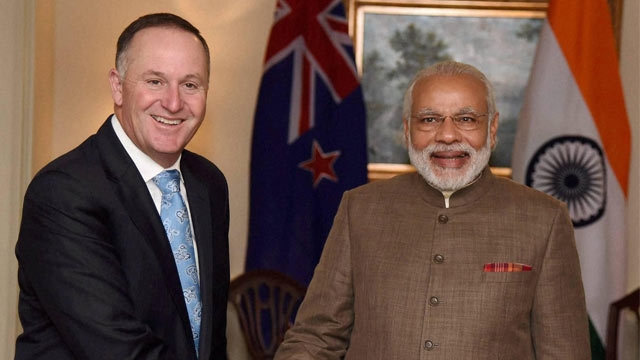
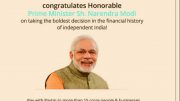
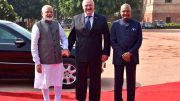
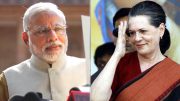
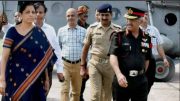
Be the first to comment on "John Key meets Narendra Modi, India, New Zealand agree to expand commercial ties"